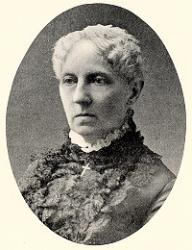Planning worship?
Check out our sister site, ZeteoSearch.org,
for 20+ additional resources related to your search.
- |
User Links
Person Results
Caroline A. Mason

1823 - 1890 Person Name: Caroline A. Mason, 1823-1890 Author of "I cannot walk in darkness long" in The Sanctuary Hymnal, published by Order of the General Conference of the United Brethren in Christ Mason, Caroline Atherton, née Briggs, daughter of Dr. Calvin Briggs, of Marblehead, b. there July 27, 1823, married Charles Mason, a lawyer at Fitchburg, in 1853, and d. there June 13, 1890. She published a volume of poems as Utterance: or Private Voices to the Public Heart, 1852. Her Lost Ring and other Poems was issued in 1891. Of her hymns the following are in common use:—
1. I cannot walk in darkness long. [Evening.] This begins with st. v. of her poem on eventide, "At cool of day with God I walk." In her Lost Ring, 1891, p. 165.
2. 0 God. I thank Thee for each sight. [The Joy of Living.] From her Lost Ring, Dec, 1891, p. 164, where it is entitled "A Matin Hymn," and begins "I lift the sash and gaze abroad."
3. The changing years, eternal God. [Adoration.] Written for the Bicentennial of the First Cong. Church, Marblehead, Aug. 13, 1884 (Lost Ring, 1891, p. 174). It begins "The changing centuries, O God."
Of these Nos. 1 and 2 are in Putnam's Singers & Songs, 1875, pp. 464-5. [Rev. James Mearns, M.A.]
--John Julian, Dictionary of Hymnology, New Supplement (1907)
Caroline A. Mason
Hugh Wilson
1766 - 1824 Composer of "AVON" in The Sanctuary Hymnal, published by Order of the General Conference of the United Brethren in Christ Hugh Wilson (b. Fenwick, Ayrshire, Scotland, c. 1766; d. Duntocher, Scotland, 1824) learned the shoemaker trade from his father. He also studied music and mathematics and became proficient enough in various subjects to become a part-time teacher to the villagers. Around 1800, he moved to Pollokshaws to work in the cotton mills and later moved to Duntocher, where he became a draftsman in the local mill. He also made sundials and composed hymn tunes as a hobby. Wilson was a member of the Secession Church, which had separated from the Church of Scotland. He served as a manager and precentor in the church in Duntocher and helped found its first Sunday school. It is thought that he composed and adapted a number of psalm tunes, but only two have survived because he gave instructions shortly before his death that all his music manuscripts were to be destroyed.
Bert Polman
Hugh Wilson
James Flint
1779 - 1855 Composer of "HARVILLE" in Christian Science Hymnal Flint, James, D.D., born at Reading, Mass., 1779, and graduated at Harvard, 1802. In 1806 he became pastor of a Unitarian Church at East Bridgewater, Mass., from which he passed to East Church, Salem, 1821. Died in 1855. In 1820 he contributed one hymn to Sewell’s New York Collection, and in 1843 he also published A Collection of Hymns, to which he contributed from 10 to 12 originals.
His best known hymns are:—
1. Here to the High and Holy One. This hymn, "On leaving an Ancient Church," appeared in the Cambridge Selection of 1828.
2. In pleasant lands have fallen the lines. Remembrance of our Fathers. Written for the bicentenary of Quincy, Mass., May 25, 1840, and published in his Collection, 1843.
3. Happy the unrepining poor. Appeared in Sewell's New York Collection, 1820. Dr. Flint's hymns are unknown to the English Collections.
[Rev. F. M. Bird, M.A.]
--John Julian, Dictionary of Hymnology (1907)
James Flint


 My Starred Hymns
My Starred Hymns

